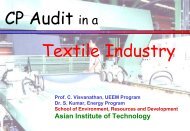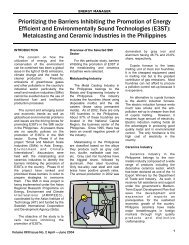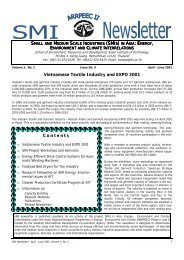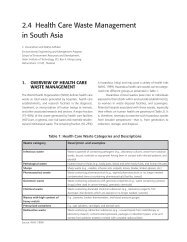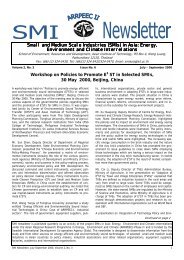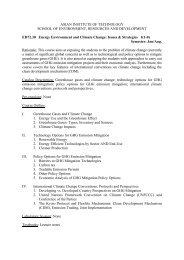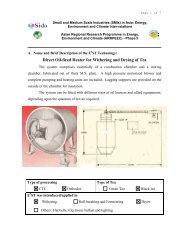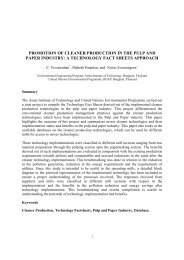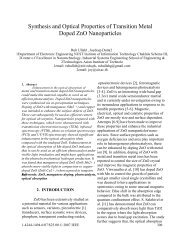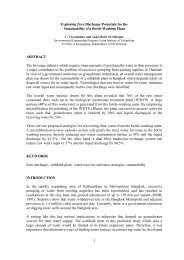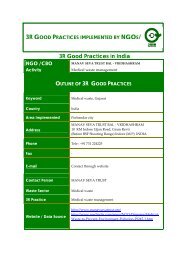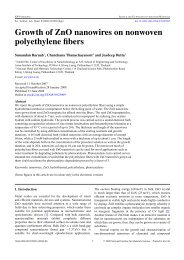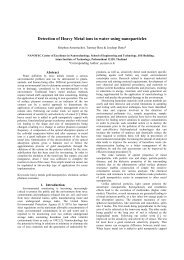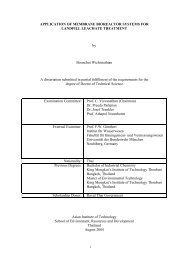A Gap Analysis in Selected Asian Countries, 3R Knowledge Hub ...
A Gap Analysis in Selected Asian Countries, 3R Knowledge Hub ...
A Gap Analysis in Selected Asian Countries, 3R Knowledge Hub ...
You also want an ePaper? Increase the reach of your titles
YUMPU automatically turns print PDFs into web optimized ePapers that Google loves.
12<br />
<strong>3R</strong> <strong>Gap</strong> <strong>Analysis</strong> and F<strong>in</strong>d<strong>in</strong>gs<br />
F<strong>in</strong>d<strong>in</strong>gs<br />
The analysis of the current scenario of<br />
healthcare waste management <strong>in</strong> Bangladesh<br />
reveals the follow<strong>in</strong>g:<br />
• No specific agency has been identified as<br />
responsible for healthcare waste<br />
management <strong>in</strong> the country<br />
• Lack of cooperation with<strong>in</strong> and among<br />
various agencies is a pert<strong>in</strong>ent problem<br />
• In some areas, awareness <strong>in</strong>itiatives have<br />
been undertaken by some NGOs. However,<br />
lack of awareness of potential risks exist<br />
• Hospital authorities tend to overlook health<br />
issues as it <strong>in</strong>volves huge budgets<br />
• Lack of <strong>in</strong>-house management, such as the<br />
central recycl<strong>in</strong>g of selected items ike sal<strong>in</strong>e<br />
bags and conta<strong>in</strong>ers <strong>in</strong>side some hospitals<br />
• Unauthorized healthcare waste segregation,<br />
recycl<strong>in</strong>g and reuse is often conducted <strong>in</strong><br />
and outside hospitals by <strong>in</strong>formal sectors<br />
There is no separate policy or handl<strong>in</strong>g rules<br />
for solid waste management, there is no<br />
specific legislation perta<strong>in</strong><strong>in</strong>g directly to the<br />
handl<strong>in</strong>g, transportation or disposal of<br />
healthcare waste <strong>in</strong> the Bangladesh<br />
Environmental. Protection Act (1995).<br />
E-WASTE<br />
Like other develop<strong>in</strong>g <strong>Asian</strong> countries,<br />
Bangladesh also imports tons of e-waste every<br />
year. The recent ban on import<strong>in</strong>g e-waste to<br />
Ch<strong>in</strong>a has diverted much of it to Bangladesh<br />
and other neighbor<strong>in</strong>g countries due to cheap<br />
labor and recycl<strong>in</strong>g bus<strong>in</strong>esses. This e-waste<br />
recycl<strong>in</strong>g or computer recycl<strong>in</strong>g has been<br />
lucrative, with much money be<strong>in</strong>g made. It<br />
<strong>in</strong>volves employ<strong>in</strong>g people to strip down the<br />
computers and extract parts that can be used<br />
aga<strong>in</strong> <strong>in</strong> mach<strong>in</strong>es to be sold on the high street.<br />
The rest is then burned or dumped, both of<br />
which are potentially hazardous to the<br />
environment. The process of extraction uses all<br />
k<strong>in</strong>ds of chemicals, like acids which are<br />
dumped <strong>in</strong>to the soil and go <strong>in</strong>to the<br />
groundwater. Currently, there is not much data<br />
available on e-waste management <strong>in</strong><br />
Bangladesh but it does not reflect the absence<br />
of any backyard smelt<strong>in</strong>g of circuit boards and<br />
manual dismantl<strong>in</strong>g of computer parts.<br />
F<strong>in</strong>d<strong>in</strong>gs<br />
E-waste recyclers<br />
Source: <strong>3R</strong> South Asia Expert Workshop,<br />
Nepal 2006<br />
Used Lead Acid Battery (ULAB) and plastic<br />
waste recycl<strong>in</strong>g has picked up its pace (mostly<br />
<strong>in</strong>formal sectors) due to the change <strong>in</strong> the waste<br />
streams and <strong>in</strong>crease <strong>in</strong> the vehicle use. These<br />
two areas of recycl<strong>in</strong>g employ thousands of<br />
<strong>in</strong>formal sectors despite to their health risks and<br />
environmental pollution. For <strong>in</strong>stance, every<br />
month, around 600 tons of lead is recycled, and<br />
the <strong>in</strong>formal sector rebuilds over 100,000 pieces<br />
of plate separators besides repair<strong>in</strong>g large<br />
numbers of other batteries. In 2005, over 85% of<br />
the produced batteries were recycled.<br />
Three types of technology are currently <strong>in</strong> use:<br />
1. Rotary Furnace (recovery rate of 65%)<br />
2. Mondir Chulli (recovery rate of 60%)<br />
3. Pan or Hole process (recovery rate of 55-60%)<br />
The current recovery rate <strong>in</strong>dicates the potential<br />
to upgrade the exist<strong>in</strong>g smelt<strong>in</strong>g technology to<br />
recover more lead from the ULAB compared to<br />
developed countries where the recovery rate is<br />
over 70% (Waste Concern, 2006).<br />
GAPS FOR IMPLEMENTATION OF <strong>3R</strong><br />
Worldwide, experiences <strong>in</strong>dicate that apply<strong>in</strong>g<br />
<strong>3R</strong> is a lucrative way of tackl<strong>in</strong>g waste<br />
management issues. The first step <strong>in</strong> this<br />
exercise is an assessment of the technology<br />
options available for implement<strong>in</strong>g <strong>3R</strong>-based<br />
solutions. Proactive policies and relevant<br />
legislations emphasiz<strong>in</strong>g <strong>3R</strong>-based solutions are<br />
vital to achieve a higher success rate. While<br />
recycl<strong>in</strong>g is considered as technological ability,<br />
reduce and reuse is often considered



